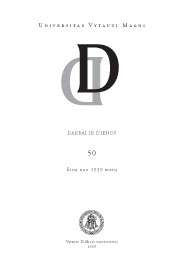BIUROKRATINIO VALDYMO STILIUS LIETUVOJE BRANDŽIOJO SOCIALIZMO METAIS
THE STYLE OF BUREAUCRATIC GOVERNANCE IN LITHUANIA DURING THE PERIOD OF “REAL SOCIALISM”
Author(s): Vilius IvanauskasSubject(s): Economy
Published by: Vytauto Didžiojo Universitetas
Keywords: sovietinė biurokratija; brandusis socializmas; „deficitinė ekonomika“; soviet bureaucracy; “real socialism”; deficit economy
Summary/Abstract: This paper focuses on the management style of the Lithuanian soviet bureaucracy during the period of “real socialism.” The “everyday life” aspect of bureaucratic activities expands the perspective to look at the bureaucratic management not only as determined by the command-plan system but also as a combination of interests of local areas, social networks, and the different challenges (e.g., the blat system) of the so-called “deficit economy” during the stagnation period. The analysis was based on soviet documentary (Lithuanian and Russian archives) and fieldwork material collected among former soviet bureaucrats and “nomenclatura” members. The everyday life dimension brings attention to the social networks, routines, and strategies as the main indicators of the informal side of the bureaucratic performance, and discloses a frequent duality between official decisions and actual life (e.g., observing a distancing of the bureaucrats in practice from the ideological values and some initiatives of the central policy). In this context bureaucratic routines showing (1) the work ethics of soviet bureaucrats, 2) the specifics of cooperation between the centre’s and the republic’s institutions while issuing plans and allocating resources, and (3) the priorities of local interests on drawing up and implementing soviet development strategies all play a central role in identifying the style of bureaucratic management in Lithuania during soviet period. Looking at the work ethics aspect, participation in social networks, mutual interdependence, and career motivation were the driving forces behind the behavior of bureaucrats. The metaphor “to find a form” was the core of this kind of routine and reflected the purpose-based (rather than procedure-driven) way to shape decisions which were taken in informal environments but officially matched the ideological and legal norms. The communication between the centre‘s and the republic‘s institutions shows the importance of republic bureaucrats’ creating long-term personal relationships with Moscow colleagues and counterparts in other republics, which helped to rationalize the allocation according to the republic’s interests. This behavior discloses the importance of “local space” by influencing the technocrats of the republics to promote “native land interests”, independently of whether they are or aren’t directly subordinated to USSR ministries. All these observations let us bring out the phenomena of “bureaucratic amortization” in soviet Lithuania and to show the room for bureaucracy in everyday situations to manipulate official rules and create “efficient routines” to protect the interests of local leaders (social networks), their working spheres, and local areas.
Journal: Darbai ir dienos
- Issue Year: 2009
- Issue No: 50
- Page Range: 261-289
- Page Count: 29
- Language: Lithuanian

